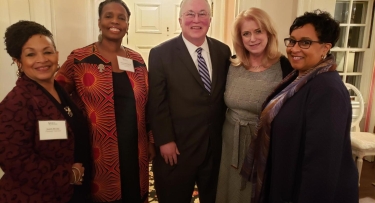
On Thursday, February 27 President Tim Hall hosted a reception in recognition of Black History Month. A gathering of Mercy College staff, faculty, alumni and students, nonprofit executives, business leaders and government officials, the reception allowed community leaders to connect with the College around the historical achievements of African Americans in the region and the contributions they have made to the vibrancy of Westchester County.
The College was especially honored to welcome Judith Beville, Town Clerk, Town of Greenburgh and founder of The 400 Years Project: A Countywide Collaborative (The 400 Years Project), as the reception special guest speaker. Beville was elected Town Clerk in November 2007 and has served the public enthusiastically with a desire to bring people together.
Exercising this passion as founder of The 400 Years Project, Beville has united historical associations, nonprofits, grassroots organizations and government officials for the purpose of acknowledging the contributions that African Americans have made to our country and, especially, to our county and local communities over the past 400 years, 1619-2019.
The 400 Years Project provides a platform for like-minded institutions, and individuals who have been conducting research for years, to feel empowered to share their information. The collaborative’s events ensure a dialogue, inclusive of all cultures, to help increase awareness, understanding acceptance and respect for people of African ancestry as well as their influences on the wealth and prosperity of our local municipalities. Beville and her partners in the collaborative have produced a series of educational events throughout Westchester with diverse audiences ranging from twenty-five to over one hundred participants.
Through the collaborative, Beville also brings awareness to the origination of indentured servitude in this country, especially on the East Coast, and how European populations and African Americans functioned equally as slaves in the 1600s. When both petitioned for better human and civil rights, the House of Burgess, British courts in Virginia at the time, granted Europeans more rights, stratifying the two groups. This disparate treatment became entrenched in the legal foundation of slavery when, during the 1600’s, the courts rendered a decision regarding two male indentured servant “run-aways” – one African and one European. The sentence for the African was a life sentence in slavery while the European received an extended indentured sentence. “There’s strength in understanding that we started out together, and that we advocated together,” Beville explains.
Beville was excited to speak at the Mercy College reception, and hoped her messages resonated with educators, students and the other attendees. “It is vital that young people understand the importance of working together, across communities, politically and educationally, at every level of our existence,” Beville said. “And, just as our schools teach this country’s struggle for freedom, it’s important for young people to learn about the struggles for freedom that almost all Americans have endured.”
